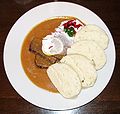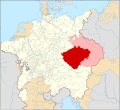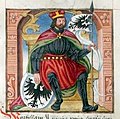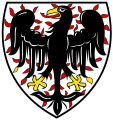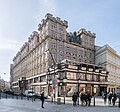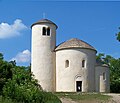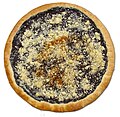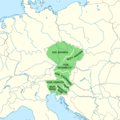Portal:Czech_Republic
Portal:Czech Republic
 |
 |
 | |
The Czech Republic, also known as Czechia, is a landlocked country in Central Europe. Historically known as Bohemia, it is bordered by Austria to the south, Germany to the west, Poland to the northeast, and Slovakia to the southeast. The Czech Republic has a hilly landscape that covers an area of 78,871 square kilometers (30,452 sq mi) with a mostly temperate continental and oceanic climate. The capital and largest city is Prague; other major cities and urban areas include Brno, Ostrava, Plzeň and Liberec.
The Duchy of Bohemia was founded in the late 9th century under Great Moravia. It was formally recognized as an Imperial State of the Holy Roman Empire in 1002 and became a kingdom in 1198. Following the Battle of Mohács in 1526, all of the Crown lands of Bohemia were gradually integrated into the Habsburg monarchy. Nearly a hundred years later, the Protestant Bohemian Revolt led to the Thirty Years' War. After the Battle of White Mountain, the Habsburgs consolidated their rule. With the dissolution of the Holy Roman Empire in 1806, the Crown lands became part of the Austrian Empire.
In the 19th century, the Czech lands became more industrialized, and in 1918 most of it became part of the First Czechoslovak Republic following the collapse of Austria-Hungary after World War I. Czechoslovakia was the only country in Central and Eastern Europe to remain a parliamentary democracy during the entirety of the interwar period. After the Munich Agreement in 1938, Nazi Germany systematically took control over the Czech lands.
Czechoslovakia was restored in 1945 and three years later became an Eastern Bloc communist state following a coup d'état in 1948. Attempts to liberalize the government and economy were suppressed by a Soviet-led invasion of the country during the Prague Spring in 1968. In November 1989, the Velvet Revolution ended communist rule in the country and restored democracy. On 31 December 1992, Czechoslovakia was peacefully dissolved, with its constituent states becoming the independent states of the Czech Republic and Slovakia.
The Czech Republic is a unitary parliamentary republic and developed country with an advanced, high-income social market economy. It is a welfare state with a European social model, universal health care and free-tuition university education. It ranks 32nd in the Human Development Index. The Czech Republic is a member of the United Nations, NATO, the European Union, the OECD, the OSCE, the Council of Europe and the Visegrád Group. (Full article...)

The Prague Spring (Czech: Pražské jaro, Slovak: Pražská jar) was a period of political liberalization and mass protest in the Czechoslovak Socialist Republic. It began on 5 January 1968, when reformist Alexander Dubček was elected First Secretary of the Communist Party of Czechoslovakia (KSČ), and continued until 21 August 1968, when the Soviet Union and most Warsaw Pact members invaded the country to suppress the reforms.
The Prague Spring reforms were a strong attempt by Dubček to grant additional rights to the citizens of Czechoslovakia in an act of partial decentralization of the economy and democratization. The freedoms granted included a loosening of restrictions on the media, speech and travel. After national discussion of dividing the country into a federation of three republics, Bohemia, Moravia-Silesia and Slovakia, Dubček oversaw the decision to split into two, the Czech Socialist Republic and Slovak Socialist Republic. This dual federation was the only formal change that survived the invasion. (Full article...)
Photographer: Jerzy Strzelecki; License: Dual (GNU Free Documentation License and Creative Commons CC-BY-SA)
- 5 April 1937 – Prague Václav Havel Airport (pictured) opens as Prague Ruzyně Airport
- 7 April 1348 – Charles University in Prague is founded
- 17 April 1969 – First Secretary of the Communist Party of Czechoslovakia, Alexander Dubček, is replaced by Gustáv Husák
- 18 April 1920 – The first parliamentary elections are held in Czechoslovakia
- 26 April 1945 – The Red Army liberates the city of Brno at the end of World War II
Vratislav Lokvenc (Czech pronunciation: [ˈvracɪslaf ˈlokvɛnts], born 27 September 1973) is a Czech former professional footballer who played as a forward. After playing youth football for Náchod and Hradec Králové, he began his senior club career with the latter team. After moving to Sparta Prague he won five league titles and one cup, as well as the 1999–2000 league top scorer award. He subsequently played abroad, playing club football in Germany, Austria and Switzerland for 1. FC Kaiserslautern, VfL Bochum, Red Bull Salzburg, FC Basel and FC Ingolstadt 04. He retired in 2009.
Lokvenc played international football for the Czech Republic. He played at the 1997 FIFA Confederations Cup before going on to take part in three major competitions. He made three substitute appearances at Euro 2000 and played in one game at Euro 2004. His last international tournament was the 2006 World Cup, where he played in two group matches before missing the third through suspension. The Czech Republic did not qualify for the next round of the competition and Lokvenc subsequently retired from international football in 2006. (Full article...)
- ...that the Sedlec Ossuary is a chapel decorated with the bones of 40,000 people?
- ... that the leftist Czechoslovak Chemical Workers' Union was expelled from the OSČ trade union centre in 1922?
- ... that, having played 465 league matches, Jaroslav Šilhavý holds the record for the most appearances in top-flight Czech football?
- ... that Josef Jiří Kolár was the first to begin a systematic translation of Shakespeare's plays into Czech?

Czech lands: Bohemia • Moravia • Czech Silesia
History: Únětice culture • Boii • Marcomanni • Samo • Great Moravia • Přemyslid dynasty • Lands of the Bohemian Crown • Czech lands (1526–1648) • 1648–1867 • 1867–1918) • Czechoslovakia • Czech Republic
Geography: Lakes • Protected areas • Regions • Rivers
Law: Judiciary • Law enforcement • Supreme Court of the Czech Republic
Politics: Administrative divisions • Government • Constitution • Elections • Foreign relations • Army • Parliament • Political parties • President • Prime Minister
Economy: Banks • Czech koruna • Energy • Oil and gas deposits • Stock Exchange • Tourism • Transport
Culture: Architecture • Art • Cinema • Cuisine • Demographics • Education • Language • Literature • Media • Music • Philosophy • Prostitution • Public holidays • Religion • Sport • Television • Video games
Symbols: Flag • Coat of arms • National anthem (Kde domov můj)
Lists: Outline of the Czech Republic • List of Czech Republic–related topics
The following Wikimedia Foundation sister projects provide more on this subject:
-
Commons
Free media repository -
Wikibooks
Free textbooks and manuals -
Wikidata
Free knowledge base -
Wikinews
Free-content news -
Wikiquote
Collection of quotations -
Wikisource
Free-content library -
Wikiversity
Free learning tools -
Wikivoyage
Free travel guide -
Wiktionary
Dictionary and thesaurus






